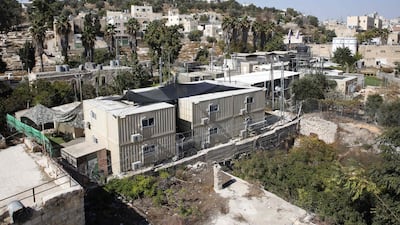A group of MPs have written to British Foreign Secretary Boris Johnson asking whether the UK government would join eight other European countries in demanding compensation from Israel for demolished Palestinian structures in an area of the occupied West Bank.
The group, led by Richard Burden, chair of the Britain-Palestine All-Party Parliamentary Group, also called for efforts to be made to ensure that taxpayers' money is "properly accounted for".
The letter said: "Given that the UK has funded Palestinian structures in Area C of the West Bank that have been demolished or damaged by Israel – either as directly funded projects, projects funded by the EU, and projects funded by the UN – will the UK join eight other European countries in demanding compensation from Israeli authorities?"
It added: “We believe that the government must make all effort to ensure that British taxpayers’ money is properly accounted for.”
_______________
Read more:
EU countries demand compensation from Israel over West Bank demolitions
Israel: No peace talks with Palestinian government reliant on Hamas
Outrage as University of Manchester allows event celebrating Balfour Declaration
_______________
Last week, a group of European nations wrote an official protest letter demanding over €30,000 (Dh130,000) to compensate for Israel’s actions.
Belgium is thought to be leading the protest, with France, Spain, Sweden, Luxembourg, Italy, Ireland and Denmark also involved in putting together the letter.
The eight countries provide humanitarian assistance to Area C in the West Bank and had installed solar panels, which were confiscated, and built mobile structures to serve as classrooms in Palestinian communities, which were destroyed by Israeli authorities.
Israel rejects the demand, as it argues that European activity in the area does not constitute humanitarian assistance, but rather, illegal development done without Israel’s consent. However, the European countries argue they are acting under the Geneva Convention by providing humanitarian aid to the area.
The MPs also urged Mr Johnson to do everything within his power to prevent the demolitions of these communities and many others in Area C of the West Bank.
“You will be aware of the huge parliamentary concern about the impending demolitions of the communities of Khan Al Ahmar and Susiya, where structures have been built with EU funding,” the letter said.
“We continue to urge you to do everything within your power to prevent the demolitions of these communities and many others in Area C of the West Bank.”
The letter was co-signed by Baroness Tessa Blackstone, Crispin Blunt, Tracy Brabin, Alan Brown, Alistair Carmichael, Sarah Champion, Joanna Cherry, Lord Alf Dubs, Julie Elliott, Chris Elmore, Lilian Greenwood, Louise Haigh, Graham Jones, Caroline Lucas, Holly Lynch, David Jones, Lord Frank Judd, Sandy MArtin, Matthew Pennycook, Lord Jeremy Purvis, Baroness Shas Sheehan, Paula Sheriff, Tommy Sheppard, Andy Slaughter, Kelly Tolhurst, Lord Norman Warner, Baroness Sayeeda Warsi and Lord Stewart Wood.
Central%20Bank's%20push%20for%20a%20robust%20financial%20infrastructure
%3Cul%3E%0A%3Cli%3ECBDC%20real-value%20pilot%20held%20with%20three%20partner%20institutions%26nbsp%3B%3C%2Fli%3E%0A%3Cli%3EPreparing%20buy%20now%2C%20pay%20later%20regulations%26nbsp%3B%3C%2Fli%3E%0A%3Cli%3EPreparing%20for%20the%202023%20launch%20of%20the%20domestic%20card%20initiative%26nbsp%3B%3C%2Fli%3E%0A%3Cli%3EPhase%20one%20of%20the%20Financial%20Infrastructure%20Transformation%20(FiT)%20completed%3C%2Fli%3E%0A%3C%2Ful%3E%0A
Key facilities
- Olympic-size swimming pool with a split bulkhead for multi-use configurations, including water polo and 50m/25m training lanes
- Premier League-standard football pitch
- 400m Olympic running track
- NBA-spec basketball court with auditorium
- 600-seat auditorium
- Spaces for historical and cultural exploration
- An elevated football field that doubles as a helipad
- Specialist robotics and science laboratories
- AR and VR-enabled learning centres
- Disruption Lab and Research Centre for developing entrepreneurial skills
What drives subscription retailing?
Once the domain of newspaper home deliveries, subscription model retailing has combined with e-commerce to permeate myriad products and services.
The concept has grown tremendously around the world and is forecast to thrive further, according to UnivDatos Market Insights’ report on recent and predicted trends in the sector.
The global subscription e-commerce market was valued at $13.2 billion (Dh48.5bn) in 2018. It is forecast to touch $478.2bn in 2025, and include the entertainment, fitness, food, cosmetics, baby care and fashion sectors.
The report says subscription-based services currently constitute “a small trend within e-commerce”. The US hosts almost 70 per cent of recurring plan firms, including leaders Dollar Shave Club, Hello Fresh and Netflix. Walmart and Sephora are among longer established retailers entering the space.
UnivDatos cites younger and affluent urbanites as prime subscription targets, with women currently the largest share of end-users.
That’s expected to remain unchanged until 2025, when women will represent a $246.6bn market share, owing to increasing numbers of start-ups targeting women.
Personal care and beauty occupy the largest chunk of the worldwide subscription e-commerce market, with changing lifestyles, work schedules, customisation and convenience among the chief future drivers.
Who is Tim-Berners Lee?
Sir Tim Berners-Lee was born in London in a household of mathematicians and computer scientists. Both his mother, Mary Lee, and father, Conway, were early computer scientists who worked on the Ferranti 1 - the world's first commercially-available, general purpose digital computer. Sir Tim studied Physics at the University of Oxford and held a series of roles developing code and building software before moving to Switzerland to work for Cern, the European Particle Physics laboratory. He developed the worldwide web code as a side project in 1989 as a global information-sharing system. After releasing the first web code in 1991, Cern made it open and free for all to use. Sir Tim now campaigns for initiatives to make sure the web remains open and accessible to all.
More from Rashmee Roshan Lall
Killing of Qassem Suleimani

